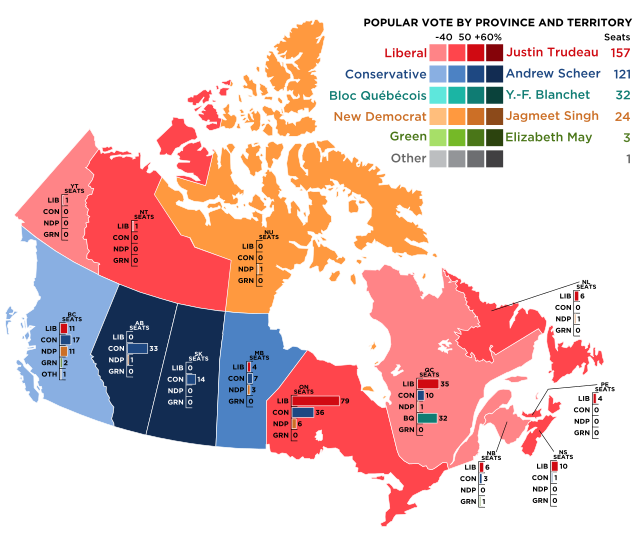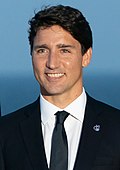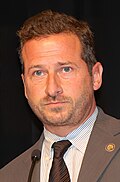The 2019 Canadian federal election (formally the 43rd Canadian general election) took place on October 21, 2019.[2]
Quick facts All 338 seats in the House of Commons 170 seats needed for a majority, Turnout ...
2019 Canadian federal election|
|
|
|
| Opinion polls |
| Turnout | 65.95%[1] (2.35pp) |
|---|
| |
First party |
Second party |
Third party |
| |
|
|
|
| Leader |
Justin Trudeau |
Andrew Scheer |
Yves-François Blanchet |
| Party |
Liberal |
Conservative |
Bloc Québécois |
| Leader's seat |
Papineau |
Regina—Qu'Appelle |
Beloeil—Chambly[a] |
| Last election |
184 seats, 39.47% |
99 seats, 31.89% |
10 seats, 4.66% |
| Seats before |
177 |
95 |
10 |
| Seats won |
157 |
121 |
32 |
| Seat change |
20 |
26 |
22 |
| Popular vote |
5,915,950 |
6,155,662 |
1,376,135 |
| Percentage |
33.07% |
34.41% |
7.69% |
| Swing |
6.40pp |
2.52pp |
3.03pp |
|
| |
Fourth party |
Fifth party |
Sixth party |
| |
|
|
|
| Leader |
Jagmeet Singh |
Elizabeth May |
Maxime Bernier |
| Party |
New Democratic |
Green |
People's |
| Leader's seat |
Burnaby South |
Saanich—Gulf Islands |
Beauce
(lost re-election) |
| Last election |
44 seats, 19.71% |
1 seat, 3.45% |
pre-creation |
| Seats before |
39 |
2 |
1 |
| Seats won |
24 |
3 |
0 |
| Seat change |
15 |
1 |
1 |
| Popular vote |
2,849,214 |
1,162,361 |
292,808 |
| Percentage |
15.93% |
6.50% |
1.64% |
| Swing |
3.78pp |
3.07pp |
pre-creation |
|
 Popular vote by province, with graphs indicating the number of seats won within that province. (Because seats are awarded by the popular vote in each riding, the provincial popular vote does not necessarily translate to more seats.) |
|
Close








